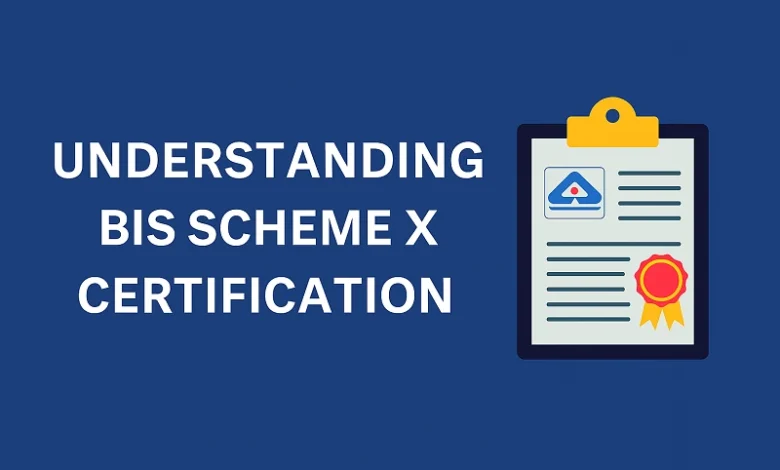Understanding BIS Scheme X Certification: A Guide for Manufacturers

In India, product quality and safety for consumers are of utmost importance. Whether you are a domestic manufacturer or an international supplier looking to enter the Indian market, you are likely to have heard of BIS Certification. But, what exactly is the BIS Scheme “X”?
BIS Scheme “X” is administered by the Bureau of Indian Standards (BIS) – the national standards organization responsible for developing quality standards for an array of products in India. The BIS under scheme “X” issues certifications to the manufacturer, allowing them to use the BIS mark on their products, as a result of successfully passing all applicable Indian Standards (IS).
This certification represents safety, reliability, and compliance; it is compulsory for a lot of products before they can be sold in India. BIS Scheme X is a compulsory certification for a category of low-voltage switchgear, control gear, and machinery, electrical and mechanical products, to demonstrate conformity with safety and quality level standards within India.
What is BIS Scheme X Certification?
BIS Scheme-X Certification is a mandatory certification scheme for machinery and mechanical equipment, including a wide range of items from machine tools and rubber/plastic machinery to various types of electrical machinery, gears, and transformers.BIS Certification is not just a formality; it is a legal requirement for many product categories. Here are some reasons why it matters:
- Legal Requirement: You cannot import, sell, or distribute many products classified under QCOs (Quality Control Orders) unless the product is certified by BIS.
- Consumer Trust: The BIS mark represents trust and quality. Indian consumers are aware that the BIS mark is a representation of safety.
- Access to Market: Without certification, your product may be rejected at the Port of Entry or from the market altogether.
- Lower Liability: Certified products are less likely to be associated with complaints, recalls, or legal liability.
- Legitimacy: BIS Certification lends credibility to your product and contributes to the brand value in the Indian market.
What Products Fall Under the BIS Scheme X?
Each of these products must comply with specific Indian Standards (IS) codes and cannot be legally sold without the BIS mark. You can check the complete list of items under the Scheme X mandatory Product certification.
- Low–Voltage Switchgear and Controlgear: Electrical Emergency Stop Devices with Mechanical Latching Function
- Low–Voltage Switchgear and Controlgear Proximity Switches
- Low–Voltage Switchgear and Controlgear: A.c.semiconductor Motor Controllers and Contactors for Non–Motor Loads
- Low–Voltage Switchgear and Controlgear: Electromechanical Control Circuit Devices and Switching Elements
- Low–Voltage Switchgear and Controlgear: A.c. Semiconductor Motor Controllers and Starters
- Low–Voltage Switchgear and Controlgear: Electromechanical Contactors and Motor–Starters
- Low–Voltage Switchgear and Controlgear: Switches, disconnectors, Switch Disconnectors and Fuse–Combination Units
- Low–Voltage Switchgear and Controlgear: Circuit Breakers
Step-by-Step Process to Get BIS Scheme X Certification
Although acquiring a certification may sound complicated, once you break it up into smaller steps, the process becomes clearer:
- Step 1: Identify the IS (Indian Standard) that is applicable. The first step is the identification of the applicable IS code for your product. Each product type has an IS code that specifies requirements regarding material, performance, and safety.
- Step 2: Prepare other required documents. Documents most commonly required include:
Business registration and factory licensing, Manufacturing process chart, Quality control plan, Calibration certificates, and a complete list of lab equipment.
- Step 3: Apply to BIS: You will have to submit your application through the Manakonline portal, which also requires the necessary fee and document submission. You will be required to select the appropriate IS code and scheme (if applicable, Scheme X is for BIS mark).
- Step 4 Factory Infrastructure & Inspection: Ensure that your factory has the required infrastructure. Staff trained in manufacturing and quality control, and an appropriate testing lab (with calibrated equipment) should be available. BIS officials will conduct a factory inspection to ensure proper manufacturing, quality control procedures, and infrastructure are in place.
- Step 5 & Sample Testing: Product samples will be drawn during inspection and tested in your in-house lab or through a BIS-approved third-party lab. You must pass all tests.
- Step 6 Grant of License: If the product passes the quality checks and the factory meets all requirements, BIS grants the license to use the BIS mark.
Timeline for BIS Certification
Below, we have mentioned the timeline for both domestic and foreign manufacturers for obtaining Scheme X Certification:
- For domestic manufacturers, the process usually takes 4 to 6 weeks, depending on factory readiness and testing.
- For foreign manufacturers, the process may take 6 to 10 weeks due to additional documentation and overseas inspections under the FMCS (Foreign Manufacturers Certification Scheme).
Common Errors for Manufacturers to Avoid
To obtain BIS (Bureau of Indian Standards) certification easily, it is important to know and avoid some common mistakes. Here is an overview of these common errors and mistakes:
- Incomplete Applications or Incorrect IS Code: Applications that are missing required information or not selecting the right Indian Standard (IS) safety code can create obvious problems.
- Missing or Outdated Lab Calibration Certificates: Labs must comply with strict calibration conditions. If you submit distortion calibration certificates or the calibration has expired, this will create immediate problems with your submission.
- Inadequate Lab Setup/Limited Types of Testing: A lab that has inadequate specifications, or the lab lacks adequate or necessary testing will put your product testing at risk.
- Sample is Non-Compliant and Fails Testing: If the sample you submitted does not follow the compliance, you will not pass the product testing.
- Quality Control Staff Training: If your staff is not properly trained, your quality may suffer, leading to errors from oversight. Training is a valuable investment to comply with standards.
- Disregarding Product Marking Requirements: If you don’t comply with product marking, this can cause confusion about compliance.
Conclusion
BIS Scheme X Certification is more than just a regulatory requirement — it’s a mark of trust, safety, and quality in the Indian market. For manufacturers, whether domestic or overseas, complying with this scheme not only ensures legal access to India’s growing economy but also strengthens your brand’s credibility and customer confidence.
At ERCS Private Limited, we simplify the BIS certification process — guiding you through documentation, product testing, inspections, and approvals with complete transparency and efficiency.





